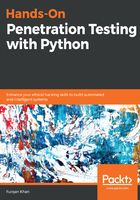
Python keywords
Keywords, as the name implies, are certain reserved words that have a predefined meaning within a particular language implementation. In other languages, we cannot usually name our variables with the same name as that of the keywords, but Python is a slightly different case. Although we shouldn't name the variables or identifiers with the same name as those reserved for keywords, even if we do, the program will not throw any errors and we will still get an output. Let's try to understand this with the help of a conventional C program and an equivalent Python script:

It should be noted that this is a simple C program in which we have declared an integer and used the int identifier to identify it, following which we simply print hello world.
When we try to compile the program, however, it throws a compilation error, as shown in the following screenshot:

Let's try to do the same in a Python shell and see what happens:

It can be seen that the program did not throw any errors when we declared our variable with the names int and str. Although both int and str are Python keywords, in the preceding case, we saw that a variable declared with name as int held a string value and a variable declared with str type held an int value. We also saw how a normal variable, a, was typecasted from int to string type. From this, it can be established that we can use reserved words as variables in Python. The downside of this is that if we are to make use of keywords as variables or identifiers, we are overriding the actual functionality that these reserved words possess. When we override their actual behavior within the scope of our program, they will follow the updated or overridden functionality, which is very dangerous as this would make our code fall out of Python's conventions. This should always be avoided.
Let's extend the preceding example. We know that str() is a built-in Python function, the purpose of which is to convert a numeric data type into a string type, as we saw for variable a. Later on, however, we overwrote its functionality and, for the scope of our program, we assigned it to an integer type. Now, at any point in time during the scope of this program, if we try to use the str function to convert a numeric type into a string, the interpreter will throw an error, saying that the int type variables can't be used as methods, or that they are not callable, as shown in the following screenshot:

The same would hold true for the int method and we would no longer be able to use it to type cast a string to its equivalent integer.
Now, let's take a look at other types of keywords that are available in Python that we should try not to use as our variable names. There is a cool way to do this with the Python code itself, which lets us print the Python keywords in the Terminal window:

The import statement is used to import the libraries in Python, just as we use imports for importing packages in Java. We will get into the details of using imports and loops in future sections. For now, we will look at what the different Python keywords mean:
- false: The Boolean false operator.
- none: This is equivalent to Null in other languages.
- true: The Boolean true operator.
- and: The logical and that can be used with conditions and loops.
- as: This is used to assign an alias to a module that we import.
- assert: This is used with the objective of debugging code.
- break: This exits the loop.
- class: This is used to declare a class.
- continue: This is the traditional continue statement used with loops that can be used to continue the execution of a loop.
- def: This is used to define a function. Every Python function needs to be preceded by the def keyword.
- del: This is used to delete objects
- elif: The conditional else...if statement.
- else: The conditional else statement.
- except: This is used to catch exceptions.
- finally: This is used with exception handling as part of the final block of code in which we clean our resources.
- for: The traditional for loop declaration keyword.
- global: This is used to declare and use global variables.
- if: The conditional if statement.
- import: This is used to import Python libraries, packages, and modules.
- in: This is used to search between Python strings, lists, and other objects.
- is: This is used to test the identity of an object.
- lambda: This is used with Lambda functions.
- nonlocal: This is used to declare a variable inside a nested function that is not local to it.
- not: This is a conditional operator.
- or: This is another conditional operator.
- pass: This is used as a placeholder in Python.
- raise: This is used to raise an exception in Python.
- return: This is used to return from a function.
- try: The traditional try keyword that's used with exception handling.
- while: This is used with the while loop.
- with: This is used with file opening and so on.
- yield: This is used with generators.
- from: This is used with relative imports.
Throughout this book, we will learn about all the keywords mentioned in this list.